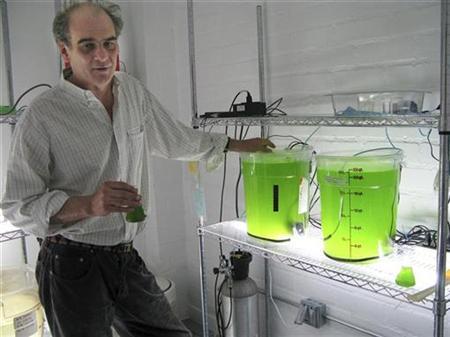Date: 11-Feb-09
Country: UK
Author: Stuart McDill
Can Algae Save The World - Again? Photo: Bernie Woodall

Nicholas Eckelberry, co-founder and inventor of OriginOil,
stands next to two test batches of nannochloropsis algae at the company's
laboratory in Los Angeles December 12, 2008.
Photo: Bernie Woodall
PLYMOUTH - Can algae save the world again? The microscopic green plants
cleaned up the earth's atmosphere millions of years ago and scientists hope
they can do it now by helping remove greenhouse gases and create new oil
reserves.
In the distant past, algae helped turn the earth's then inhospitable
atmosphere into one that could support modern life through photosynthesis,
which plants use to turn carbon dioxide and sunlight into sugars and oxygen.
Some of the algae sank to sea or lake beds and slowly became oil. "All we're
doing is turning the clock back," says Steve Skill, a biochemist at the
Plymouth Marine Laboratory.
"Nature has done this many millions of years ago in producing the crude oil
we're burning today. So as far as nature is concerned this is nothing new,"
he said.
The race is now on to find economic ways to turn algae, one of the planet's
oldest life forms, into vegetable oil that can be made into biodiesel, jet
fuel, other fuels and plastic products.
"So we are harvesting sunshine directly using algae, then we are extracting
that stored energy in the form of oil from the alga and then using that to
make fuels and other non-petroleum based products," Skill said.
He predicted that industry will be cultivating algae in viable quantities
for commercial oil production with a decade.
Such fuels are considered to be net carbon neutral because the algae absorb
greenhouse gases when they grow.
TEST FLIGHT
Many companies are working on algae and biofuels including U.S. groups
Sapphire Energy, OriginOil, BioCentric Energy and PetroAlgae.
Among uses, Japan Airlines had a test flight last month with a jet fuel and
biofuels blend including algae oils.
Brazil's MPX Energia plans to trap 10-15 percent of carbon emissions from a
coal-fired power plant by feeding them to algae when it starts in 2011.
Plymouth Marine Laboratory says it is taking what we know about algae in the
world's oceans and applying it to biotechnology, an approach which differs
from much of the commercial research underway, where some claims about the
possibilities of algal biofuels are overstated, according to Carole
Llewellyn, a marine chemist.
"They (algae) do have a lot of positive attributes but there are a lot of
hurdles that have to be overcome before this becomes a commercial reality,"
Llewellyn said.
Cultivating crops on prime farmland to produce bio-diesel has been widely
criticized for helping sustain higher food prices. But many strains of algae
grow in sites otherwise uninhabited, from salt-water marshland to deserts.
They can grow 20 to 30 times faster than food crops.
Research in Plymouth includes identifying which strains of algae will
produce the most oil or absorb the most CO2 in differing growing mediums.
Algae's requirement of a source of carbon dioxide has also stimulated
interest from industrial plants which see the possibility of feeding algal
beds with carbon-rich exhaust fumes from their power plants.
Research into replacing petroleum based fuels and products with biodiesel
from algae is not new.
The U.S. government began funding research in the 1970s and only
discontinued the program in 1996 when it was reported that producing
bio-diesel simply cost too much and would not become economic until oil
prices rose to $40 a barrel. Prices for Brent crude on Tuesday were $46 a
barrel.
© Thomson Reuters 2009 All rights reserved
